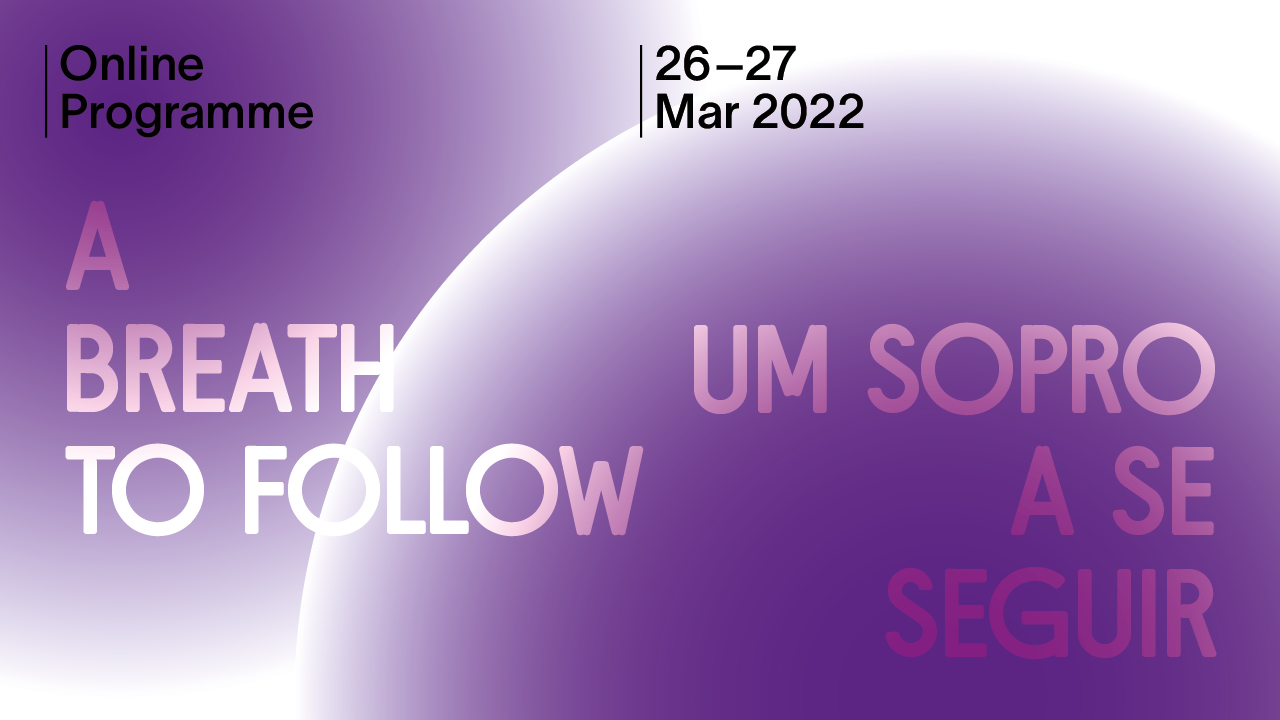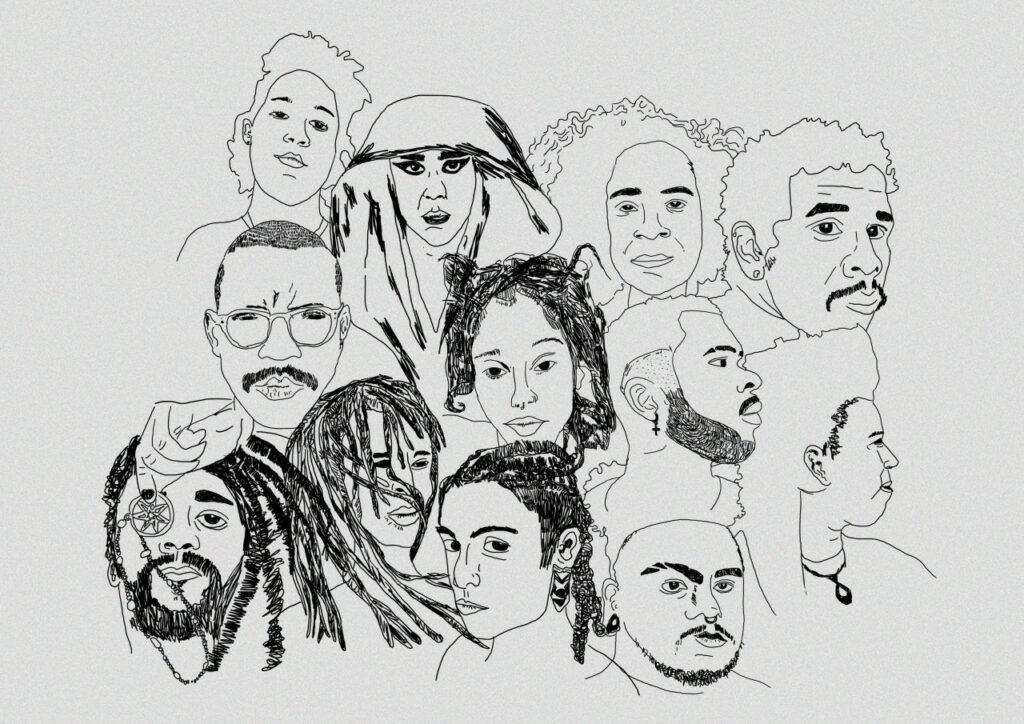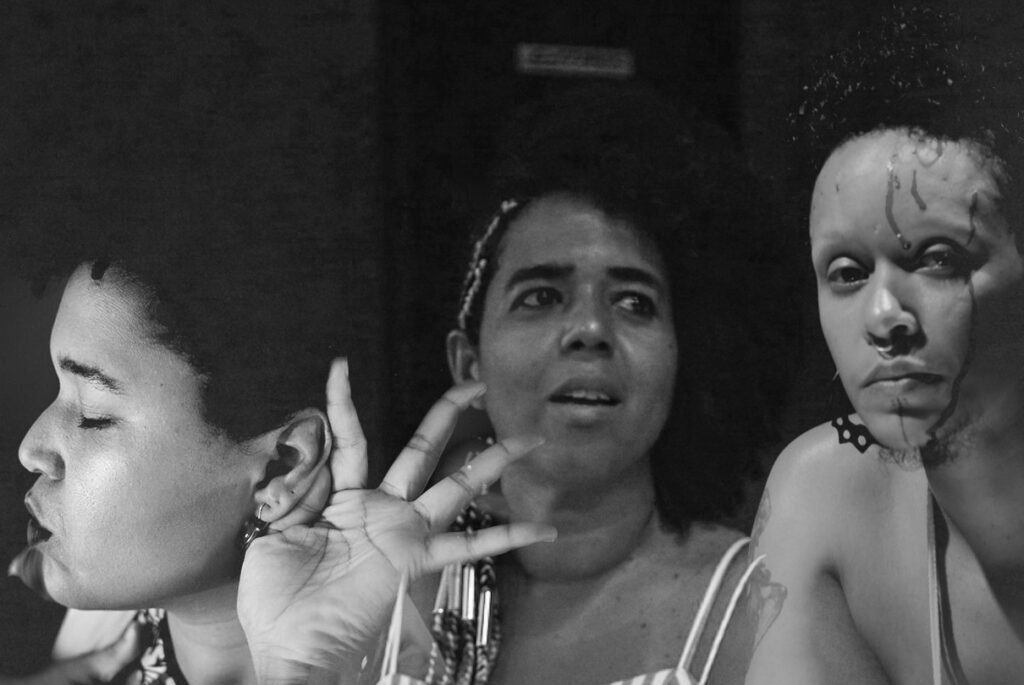
A Breath to Follow | Um sopro a se seguir
Two days of online discussions and artists presentations exploring the cosmological, decolonial, sensorial practices of Black and Indigenous grass roots art, dance and music collectives in Brazil.
Dois dias de discussões e apresentações online de artistes explorando as práticas cosmológicas, decoloniais e sensoriais de coletivoas de arte, dança e música de base negra e indígena no Brasil.
Poethics
Re/de-centering
Study and fugitivity
(Collective) Sensoriality
Resistance and persistence
Black and Indigenous sociality in Brazil
Dissident imaginaries/imaginaries of dissidence
Poéthica
Re/descentralização
Estudo e fuga
Sensorialidade (coletiva)
Resistência e persistência
Socialidade negra e indígena no Brasil.
Imaginários dissidentes/imaginários de dissidência
A poetics can take you only so far without an h. If you’re to embrace complex life on earth, if you can no longer pretend that all things are fundamentally simple or elegant, a poetics thickened by an h launches an exploration of art’s significance as, not just about, a form of living in the real world.
That as is not a simile; it’s an ethos. Hence the h. What I’m working on is quite explicitly a poethics of a complex realism.– Joan Retellack, Poethical Wager, 2003
ReadUma poética só pode levar-te até certo ponto sem um h. Se você quer abraçar a vida complexa na terra, se você não pode mais fingir que todas as coisas são fundamentalmente simples ou elegantes, uma poética engrossada por h lança uma exploração do significado da arte como, não somente isso, como uma forma de viver no mundo real.
Isso não é um símile; é um ethos. Daí o h. O que estou trabalhando é explicitamente uma poéthica de um realismo complexo.– Joan Retellack, Poethical Wager, 2003
EN
How do visual art, sound system, DJ, curatorial and community-based Afro-Indigenous artistic initiatives in Brazil produce singular sensory fields and propose increasingly complex strategies to navigate the injunctions of the present?
How are diasporic poetics locally grounded, through an echoing of poethical codes that exceed the urge to only respond to structural violence such as the history of massive enslavement and incarceration, continuous economical and land dispossession and extraction?
How do visual artists and curators working under colonial, racial, cisheteropatriarchal subjugation, practise non-hegemonic production while perforating the exclusionary systems of the institutionalised and legitimating art world circuits?
These events have come about through Arika’s ongoing entanglements, conversation and collaboration with Denise Ferreira da Silva, Valentina Desideri, Amilcar Packer, Ana Lira, Camilla Rocha Campos and Diego Crux and other members of EhChO’s platform and the Transformative Justice Praxis Research Project. These projects both work through the spirit of friendship, transnational solidarity and facilitating material redistribution (through reparation, not charity) as well as the sharing of knowledge, practises, materials and tools. They seek to respond to the urgencies unleashed by the new global coronavirus pandemic. EhCHO provides and encourages material and immaterial expressions of support to Black, Indigenous, and LGBTQI+ Brazilian artists and collectives during the COVID-19 pandemic.
The participating collectives are mostly, but not only, concerned with matters such as systemic and structural colonial, racial and gender violence, material and financial conditions, sociality and artistic/knowledge production. Blackness and indigeneity, and the alliances and intersections between African diasporic and indigenous people’s practices of imagination and resistance, are both back and fore grounds to their work. They move towards and with the development of different forms of organising, and systems of and for production; exploring possibilities for facing state and official institutional architectures and manifestations of violence.
PT
Como as artes visuais, sound systems, DJs, a curadoria e as iniciativas artísticas afro-indígenas de base comunitária no Brasil produzem campos sensoriais singulares e propõem estratégias cada vez mais complexas para navegar pelas injunções do presente?
Como a poética da diáspora é localmente territorializada, por meio de um eco de códigos poéthicos que extrapolam as urgências em somente responder à violências estruturais, como a história de escravização e encarceramento em massa, contínua despossessão e extração econômica e de terras?
Como artistas visuais e curadoras que trabalham sob subjugação colonial, racial, cisheteropatriarcal, praticam a produção não hegemônica enquanto perfuram os sistemas excludentes dos circuitos institucionalizados e legitimadores do mundo da arte?
Esses eventos surgiram por meio de emaranhados contínuos, conversas e colaboração de Arika com Denise Ferreira da Silva, Valentina Desideri, Amilcar Packer, Ana Lira Camilla Rocha Campos e Diego Crux e outros membros da plataforma EhChO e do Projeto de Pesquisa de Práxis de Justiça Transformativa. Esses projetos funcionam tanto por meio do espírito de amizade, solidariedade transnacional e facilitação da redistribuição material (através de reparação, não de caridade), bem como pelo compartilhamento de conhecimentos, práticas, materiais e ferramentas. Buscam responder às urgências desencadeadas pela pandemia global de coronavírus. EhChO busca fornecer e incentivar manifestações materiais e imateriais de apoio a artistas e coletivos negros, indígenas e LGBTQI+ brasileiros durante a pandemia do COVID-19.
As coletivas participantes estão fortemente, mas não apenas, implicadas em questões como a violência estrutural e sistêmica, colonial, racial e de gênero, com as condições materiais e financeiras, sociabilidade e a produção artística/de conhecimento. Negridade e indigeneidade, e as alianças e interseções entre as práticas de imaginação e resistência afro diaspóricas e dos povos indígenas, estão simultaneamente como planos de frente e de fundo de seus trabalhos. Eles caminham para e com o desenvolvimento de diferentes formas de organização e sistemas de e para produção; explorando possibilidades de enfrentamento de arquiteturas institucionais estatais e oficiais e manifestações de violência.
Programme Events

Part One | Parte I
CARNI – Coletivo de Arte Negra e Indígena Periferia Segue Sangrando Denise Ferreira da Silva Ana Lira
